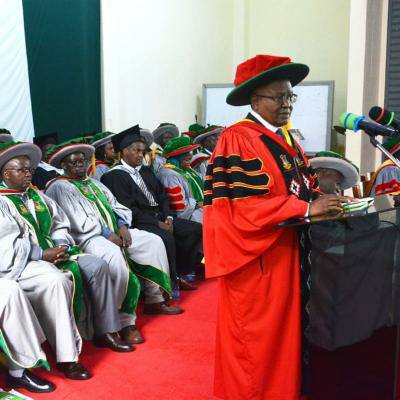

Egerton University Vice Chancellor Prof Isaac Kibwage has warned young Kenyans against using social media irresponsibly, as the consequences could be very harmful.
Kibwage indicated that social media should be a tool for empowerment and positive change, not a platform that encourages moral decay and divisive banter in digital spaces.
The Vice Chancellor pointed out that misuse of social media is not only a threat to individuals but to the very fabric of the nation.
He added that the youth and Kenyans of goodwill must reject destructive influences and use digital platforms as instruments of unity and progress.
Kibwage was delivering his orientation address to first year students at Kilimo Hall within the institution’s Njoro Main Campus.
He acknowledged the positive aspects of social media, further encouraging them to use it within reason, as negative exploitation of the platforms would have severe consequences, ultimately impacting their future.
“The internet never forgets. Post things you will be proud of even years to come. While the youth should be encouraged to produce useful content on social media and even make money from it, there should be some decorum and ground rules,” he noted.
The Vice Chancellor reminded the freshers that with freedom comes responsibility: “You are now adults. Handle yourself in a mature and responsible way,” he asserted.
He urged students to uphold integrity, maintain healthy relationships, care for their mental well-being, and embrace academic discipline.
Kibwage brought to attention of his audience the Cybercrime Act which discourages content that is disrespectful, inciteful and harmful and outlines lawful punitive measures for offences committed under the statute.
“I want to tell the young people of our country that embracing the use of social media is appreciated. But what we are seeing when it comes to the changes taking place across the globe should be a wake-up call on how they relate and interact on those platforms,” cautioned the Vice Chancellor.
“I am telling the youth to be more reasonable and at the same time, very careful in how they engage on social media,” he added.
The Don affirmed that young people must understand that the content they create and share on social media platforms has real-world implications, as what may seem like a harmless joke or comment could quickly escalate into a harmful act with serious legal and ethical consequences.
Social scientists have indicated that in the current digital age, social media has become a double-edged sword. While it offers unparalleled opportunities for connection and creativity, it also provides a platform for actions that could disorient societal values and incite harm.
Recent warnings from the Ministry of Foreign and Diaspora Affairs and Ministry of Information, Communications and the Digital Economy highlight an urgent need for youth to use social media responsibly since the consequences of misuse are grave not only for individuals, but for the nation at large.
Among these consequences, the Government has warned of was that one could be denied travel visas or jobs just because of results from a search into their social media history.
Prime Cabinet Secretary Musalia Mudavadi has since brought to the attention of Kenyan citizens that countries like the United States of America, where many Kenyan youth dream of emigrating to, had kicked off the process of setting up a framework to monitor social media usage.
"When you want to travel, your track record will be monitored, especially when you are applying for visas. For you to get clearance on your travel documents, soon your track record on social media engagements will play a critical role," Mudavadi, who doubles up the Foreign and Diaspora Affairs CS, cautioned.
“Don’t be surprised that even employers are now looking at your social media behavioural activities within the digital space. Be very careful not to shoot yourself in the foot," he added.
This, he said, should motivate Kenyan youth to be aware of the new parameters being introduced through the laws of many countries.
Mudavadi further warned that the conduct of a few youths in the social media space could tarnish the image of the entire Kenyan youth population, whom he described as disciplined, hard-working, and focused.
In January, Information Cabinet Secretary William Kabogo announced plans to introduce new laws and regulations to govern the online platforms.
"On the issue of hate speech and harmful content, this is a matter of every country having its own regulations. It is true when you look at TikTok, Facebook, and X, you will find all sorts of pornography even available to children,” Kabogo said.
A cybersecurity expert based in Nakuru Dr Nyamweya Mosisa concurred with the Ministry of Foreign and Diaspora Affairs noting that the visa process for the US now includes deeper social media vetting, checking one’s posts, one’s handles and one’s digital trail, to gauge if an individual is a risk.
In particular, the US State Department, he added, had earlier instructed embassies and consulates around the world to pause new student visa appointments as it moved to expand social media screening and vetting to all applicants for student visas.
“Other countries are catching on, and within the world, immigration agencies often share notes. One careless comment could bar you from entry into a country where you are chasing a life-changing opportunity,” Mosisa warned.
“Our youth should not let online outbursts lock those doors before they even knock. As global migration tightens, many nations coordinate to share persona non grata lists, meaning missteps in one jurisdiction can close doors everywhere. Imagine a promising graduate denied a regional CEO role because of an inappropriate tweet made during their first year at university,” he added.
Mosisa cautioned the youth not to count on hiding. He stated that anonymity is a myth in this digital age and explained that security agencies and data firms could trace every click, every post, back to an individual.
“Your choices today could limit you and your family’s opportunities tomorrow. That is not fearmongering, it is reality,” he affirmed.











